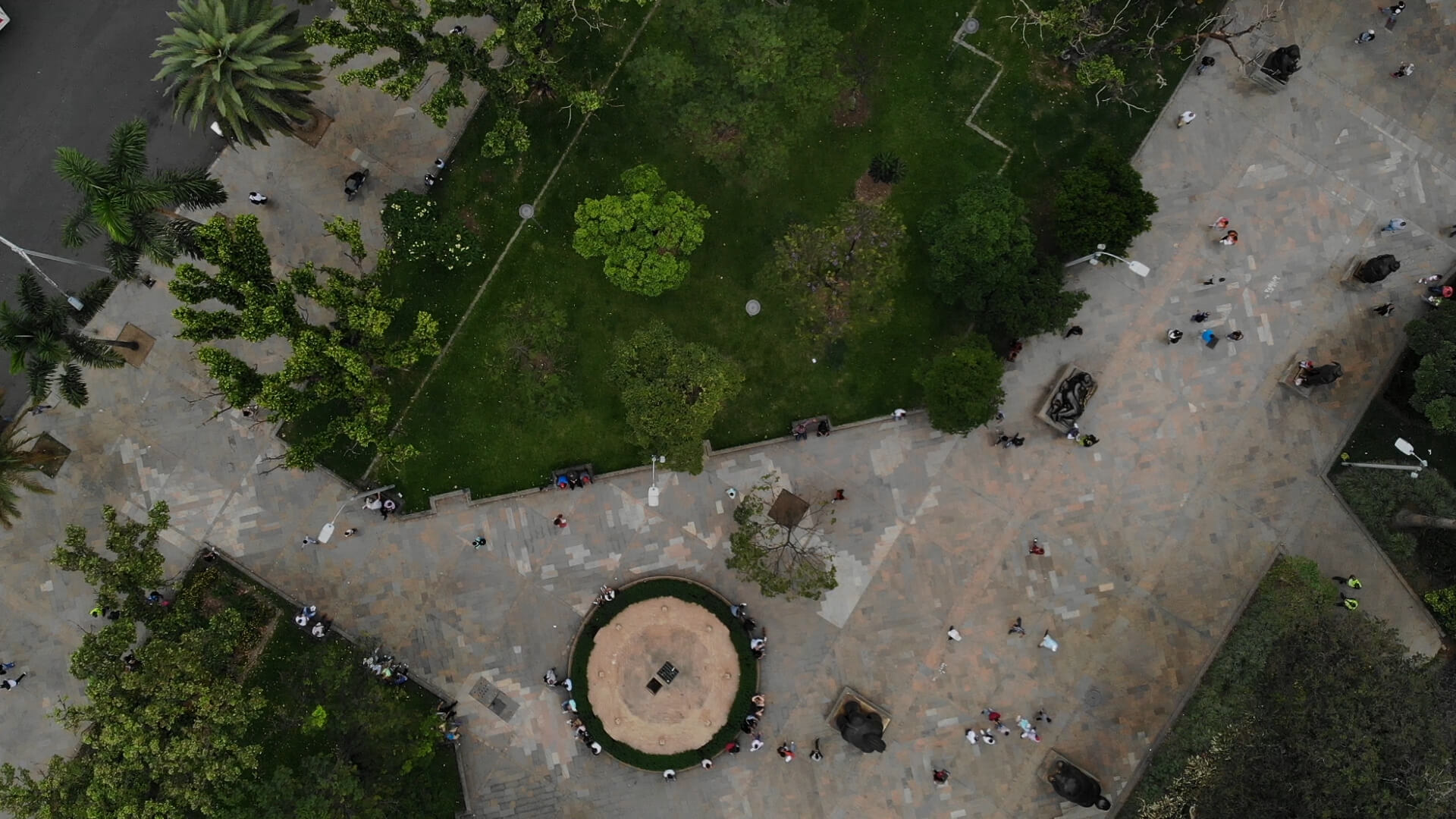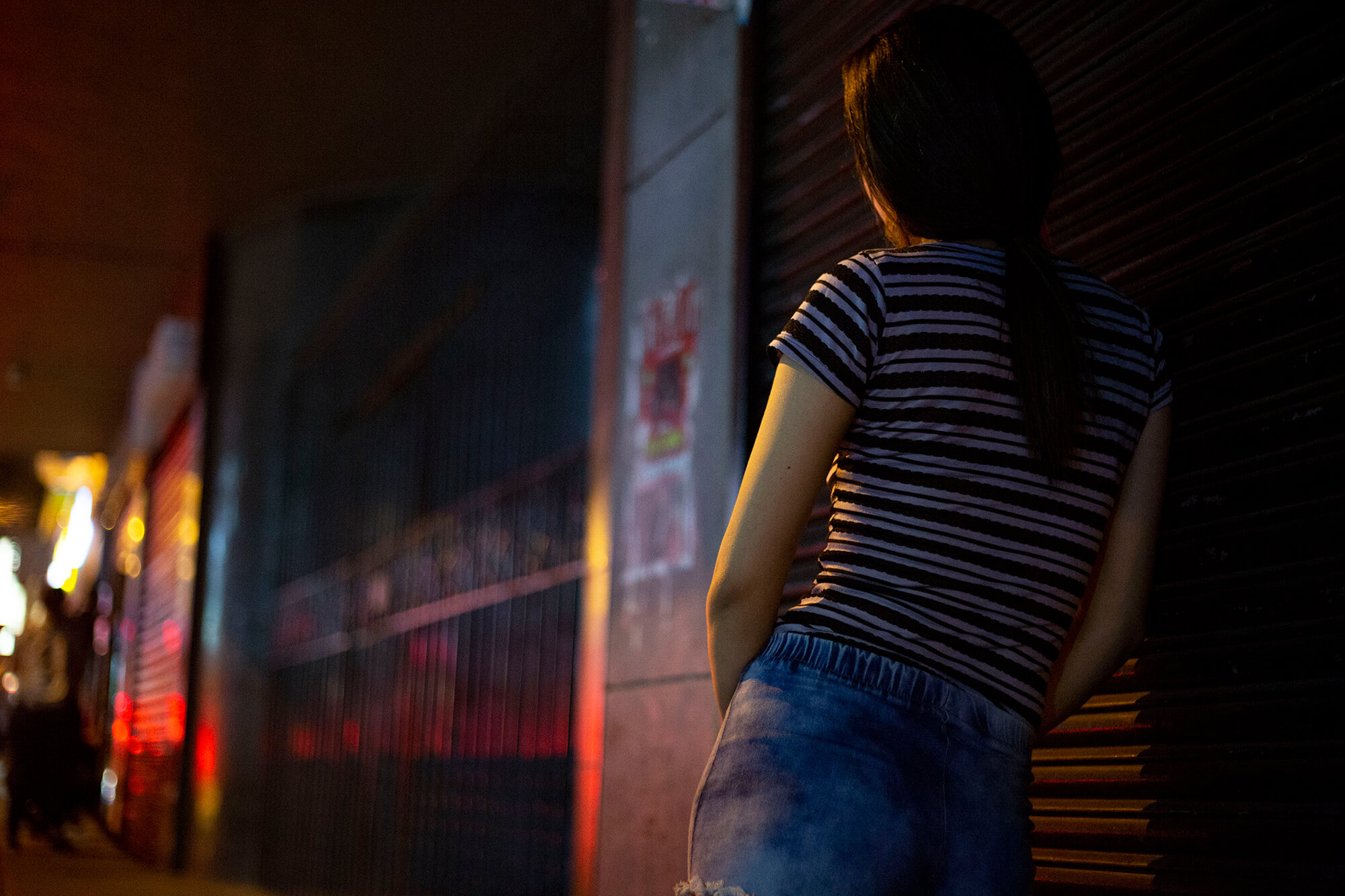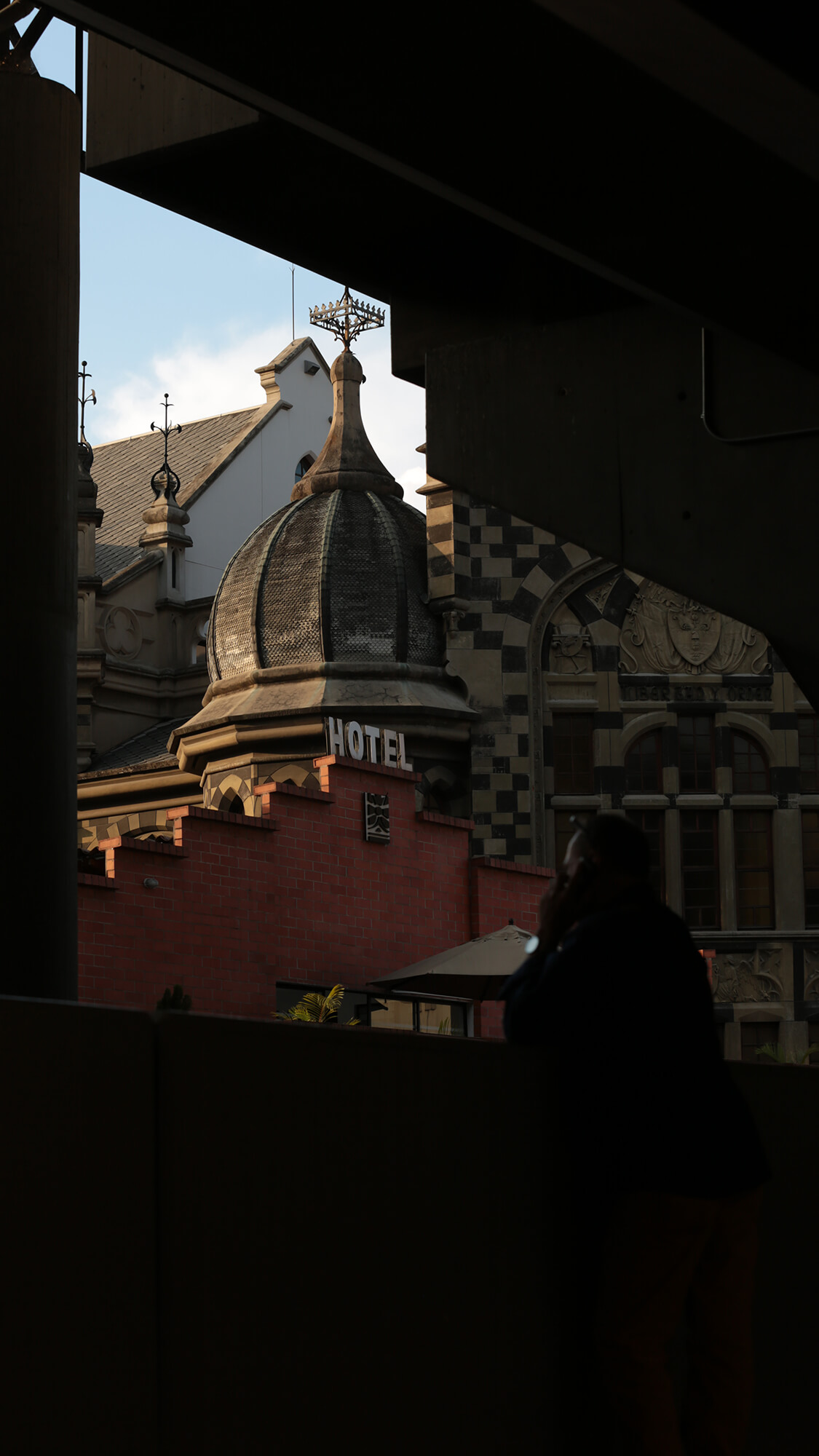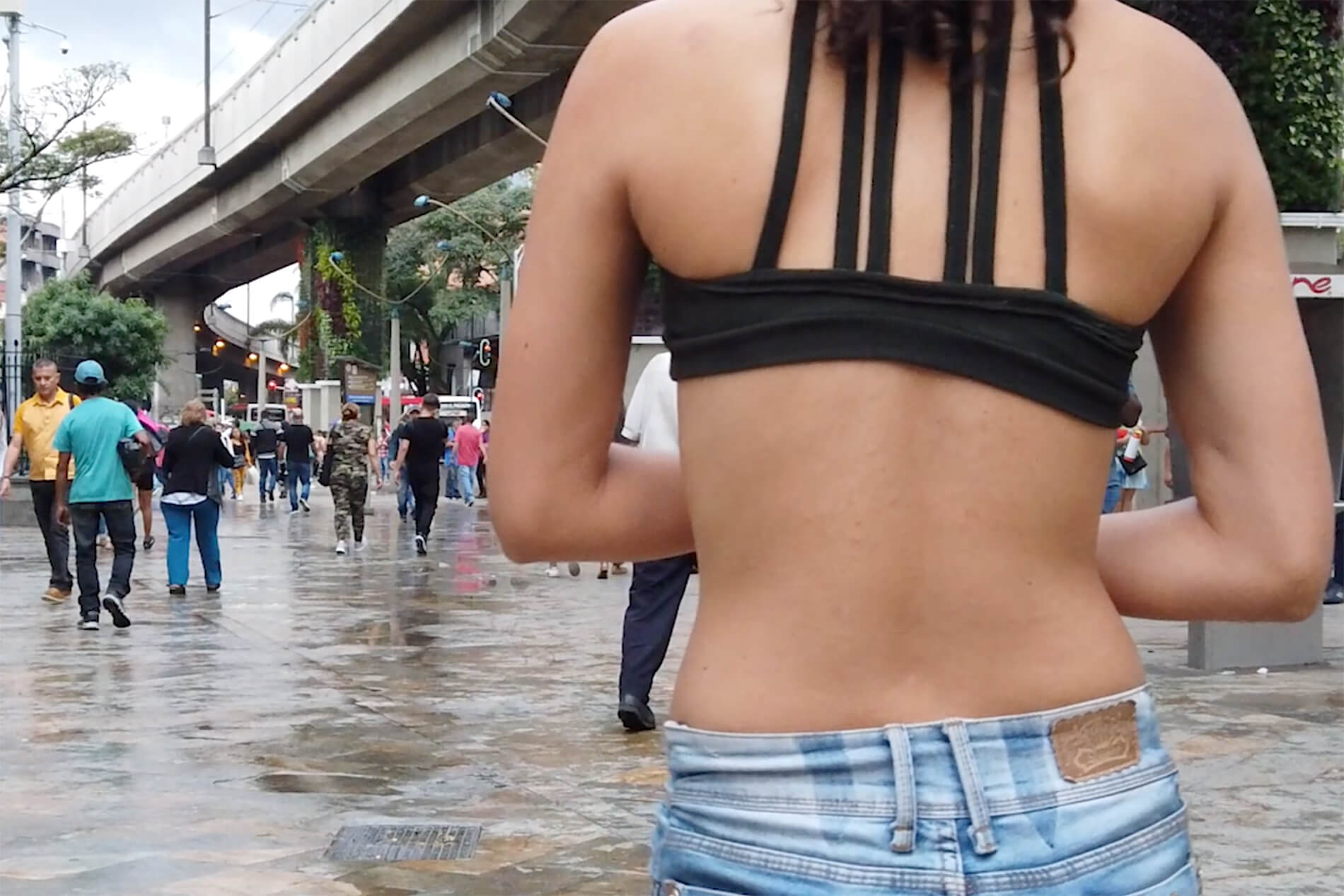Car honks and bicycle bells erupt in the ears of locals and tourists passing through Plaza Botero.
A light breeze flows through the skyscraping palm trees of the plaza. It’s cool enough to alleviate the sun’s heat but not cool enough to give one goosebumps.
But in the land of eternal spring, the weather is often unpredictable.
Fernando Botero’s statues line each side of the plaza’s entry, creating a catwalk that leads to the plaza’s focal point, the Museo de Antioquia. Behind a Botero statue of a reclining nude woman is a stoop where the men begin to line up late in the afternoon. What happens on this side of the plaza is known well by the Venezuelan women who work here – even if they wish they didn’t.
“There are people who think that if you do this, it’s because you like it or you feel good,” said Maria, 24, who is one of those women. She asked that her real name not be used. “I do not know other women, but in my case, I don’t feel good, and I don’t like it at all.”
Dressed in denim shorts and a camouflage green top, she sits on this stoop every afternoon and late into the night, waiting for men to ask for “un rato” – a moment.

Plaza Botero is known for its statues by artist Fernando Botero. He donated the statues to the city in 2002.
The single mother from Venezuela is living in Medellín without legal permission, which gives her few other options for financially supporting herself. As Venezuela faces a severe political and economic crisis, multiple South American countries have experienced an influx of Venezuelan migrants. Colombia experienced the largest arrival in the last year, according to a report by the International Organization for Migration.
Of the 1,032,016 Venezuelans that migrated to Colombia before September 2018, 51.8% were women, according to the Caracas Chronicles, a news and analysis organization in Venezuela. Many, like Maria, have been forced to turn to sex work due to the lack of stable, well-paying economic opportunities available without legal documentation to work in Colombia.
Over 35 percent of individuals involved in Colombia’s sex trade are Venezuelan, according to Colombia Reports.
“I want my country to be what it was before,” said Maria. “When there was enough money to live.”
Back home in Guatire, a small town near Caracas,Venezuela, Maria and her two daughters were financially supported by her father before the economic crisis hit. But he had to stop when he no longer had enough money to help.
“I had to beg my neighbors for food, and my children cried and begged for food because they were so hungry,” said Maria.
In this moment, she realized things needed to change. Maria’s anguish became her motivation to give her daughters something more.
“I came to make a living and a better life for my children,” she said.
She told her daughters, ages 3 and 5, that she was going to work far away but would still contact them.
Minutes before her departure on a heart-wrenching day last December, Maria’s family tried to distract her youngest daughter with milk and cookies as she slipped out. The 5-year-old, however, was aware she was leaving.
“Mom, don’t go,” she screamed, tears running down her brown cheeks. “Mom, I want to go with you!” She frantically banged on the window as Maria walked out the door.
“Even then, still I stayed hidden, crying with a desire to return,” said Maria. “I wonder if my children will miss or remember me.”
For Maria, leaving her children behind was only the beginning of many challenges.
As Maria tried entering Colombia on foot, the officers at the border asked her to return later because the customs system was not working. Instead, Maria entered the country through a nearby river and her passport wasn’t stamped. She needs that to apply for a Permiso Especial de Permanencia, but she can only get it by going through Colombian customs.
Upon entering Colombia without legal permission, Maria has been unable to obtain a PEP, a document the Colombian government issues that allows individuals to legally reside in the country for two years, according to Panas en Colombia, an initiative of El Tiempo, a newspaper in Colombia.
To become a legal citizen of Colombia without the passport stamp, Maria would need to register in the Registro Administrative de Migrantes Venezolanos. However, registration is only open during certain times of the year, and Maria will need to wait until registration is open again.
Maria’s lack of a PEP hinders her ability to find a job. While a PEP doesn’t guarantee her a job, multiple employers in Colombia recognize it.
“I asked around for work, but they said Venezuelans are thieves, but we’re here to look after our families,” said Maria. “I know Venezuelan women that are in the same situation and are trying to help their families.”
“Many Venezuelan women have turned their life around to do this.”
Aside from learning a new country’s customs and searching for work and housing, societal inequalities follow women throughout the migration process.
These inequalities include discrimination, harassment, gender violence and a lack of access to sexual and reproductive rights. Forty-three percent of female Venezuelan migrants are between 18 and 29 years old. This, along with their gender, exposes them to discrimination and stigmatization, according to Centro de Justicia y Paz, an organization that works to promote and defend Democratic values, human rights and peace in Venezuela.
Melissa Toro, director of Las Guerreras del Centro, an organization in Medellín that works to empower and resignify sex work and sex workers, said many of the sex workers she notices now weren’t sex workers before.
“Here, we have a very high level of unemployment that is difficult for undocumented immigrants,” said Toro. “Sex work is the most informal job because there are no conditions and you just need your body.”
Despite the industry’s legality in Colombia, sex workers are not guaranteed workers’ rights. According to the Sexuality, Poverty and Law Programme, a program that provides evidence-based knowledge and policy options to help achieve legal reform and tackle poverty, sex workers in Colombia are required to attend health checks. However, these are not enforced.
The Legal Status of Prostitution

VENEZUELA
Prostitution is legal for those over the age of 16.
Did You Know?
- A pack of 36 condoms was sold online for roughly $755. This reflects the growing cost of safe sex in Venezuela, leading to a spike in sexually transmitted disease and teen pregnancies.
- Traffickers are targeting Venezuelan women, mostly of poor and indigenous populations. They promise clothes, food and lodging, which causes many women to become trapped. Researchers have found that the number of sex-trafficked women has more than doubled since 2016.
After arriving in Medellín, Maria started selling “confettis,” or candy, on the street for money. She made enough to pay her $10,000 COP for a room she rents with two others for $30,000 Colombian pesos per night.
However, Maria would still go hungry for days, wondering if her daughters were doing the same.
One month passed, and Maria was not making much progress on bringing her children to Medellín.
But an encounter with a Venezuelan man made her realize that she had another choice. A choice that could quickly earn her more money but at a much higher cost.

Maria poses in a streets around Medellín. She arrived to the city, in December of 2018 and hopes to bring her daughters soon.
“You could make more money selling yourself like other women in Plaza Botero,” he told her.
Days later, she was in a hotel room with an unknown Venezuelan man. It was Maria’s first of many “ratos.”
She is pinned to the bed with a stranger on top of her. She feels his weight, but focuses her eyes on the ceiling. Physically, she is there but mentally, she is not. Her body is numb and her mind is racing with one thought: “When will it end?”
“I do not know other women but in my case, I don’t feel good and I don’t like it at all.”
It’s only supposed to be 25 minutes, but it feels like a lifetime of discomfort.
As his weight slowly lifts off of her body, a larger emotional and mental weight falls on her.
Maria’s stomach fills with acid. She feels nauseated, and her honey brown skin feels soiled with his touch.
Certain that she can wash him off, Maria runs to the hotel bathroom to take a shower.
Maria stands under the warm, steaming water for several minutes. Her effort to feel clean again fails.
She steps out of the shower and stares at the money left by the stranger. Her mindset changes, and her motivation for her actions comes to surface.
“I cried and I thought about my girls and whether or not they were eating and that I came here for a better future,” said Maria. “My hope is to bring my girls here so I can leave this life.”
She gets dressed, grabs the money off of the table and walks home.
For Maria, home in Medellín is a flophouse, a rooming house where she rents one small humid bedroom to share with two others. Faintly lit by one lightbulb in the ceiling, a bed inside a dark wooden box spring and a thin mattress pad beside it cover three quarters of the room’s red clay tiled floor. The white walls are dingy and the narrow wooden brown door is closed but the boisterous noise that comes through leaves no room for privacy.
Little by little, Maria continues to get used to “this life.”
Her grandmother cries at the thought of her granddaughter doing this to support herself. But her daughters think she sells chocolates.
She begins her work day at 2 p.m. and usually wears shorts to attract more men. The only day she won’t work is Sunday.
The employee at the hotel’s front desk already knows her. Upon entering, Maria is handed a towel, a paper towel, soap and a condom.
For 20 to 30 minutes, Maria charges COP $30,000. Before starting, clients must place half of their payment on the table.
Sex without a condom is non-negotiable. She will not perform oral sex or allow clients to kiss her mouth or touch her butt. If a client persists, Maria will charge COP $10,000 extra to let him touch her butt.
But Maria’s boundaries don’t always prevent her from experiencing the risks of sex work.
One night, a client she doesn’t care for offered her COP $35,000. Despite her negative feelings toward him, Maria accepted.

A man takes a phone call in the Berrío station, a metro station in Medellín. The metro is one of the city’s most popular forms of transportation.
About 20 minutes passed and he still hadn’t finished. He was determined to do so, even if it meant exceeding Maria’s 30-minute limit.
She asked him to stop, but he continued. He forced her to perform anal sex, violating another one of her boundaries.
When she couldn’t take it anymore, she pushed him off, escaping his grip. She grabbed the money and left the hotel room as fast as she could.
“I felt violated and didn’t work for 10 days,” said Maria. “I don’t like to spend too much time in the room with the person, because I do not know the intentions of that person for being in the room.”
The risks of being a sex worker can include verbal harassment, physical violence, sexual assault and femicide or gender-based violence.
For Venezuelan migrants who become sex workers, verbal harassment can be a form of xenophobia.
As the number of Venezuelan sex workers in Colombia increases, so does the animosity they feel from Colombian sex workers.
Adriaan Alsema, founder of Colombia Reports, said Venezuelan sex workers are more likely to offer their services for as low as COP $40,000 ( USD $12), three times less than what a Colombian sex worker charges. In the eyes of Colombian sex workers, such low prices are killing their business.
“Colombian women are very mean to Venezuelan women,” said Maria. “I don’t talk to them and just make my money.”
Maria said some men are also xenophobic toward her because they know she is Venezuelan.
In the case of physical violence, sex workers will often resort to doing things or performing acts they don’t want to. Toro said some sex workers will drink alcohol or do drugs before work to numb themselves to doing things they don’t want to.
A common factor shared among sex workers is a history of sexual abuse as a child.
For part of her childhood, Maria lived with her mother and stepfather. At the age of 16, her stepfather attempted to rape her.
When she finally told her mother, she didn’t believe Maria.
“She told me it was a lie,” said Maria. “Did I expect her to leave her partner for me?”
Toro said most victims of Medellín’s recent femicides have been sex workers.
“Out of 41 homicides last year, 56 percent were femicides and 86 percent were done in El Centro, an area for sex work,” said Toro. “Nobody ends up paying for them, and they are done in motels that don’t say anything, so motels become accomplices of murders.”
El Centro is in the same neighborhood as Plaza Botero, where Maria works.
Toro said these women are usually seen as a product that society consumes, and this contributes to the issue’s invisibility.
“The problem is invisible; they don’t even acknowledge them and there is no interaction,” said Toro. “I can’t even say they are treated badly because of the invisible problem.”
Come To Terms
A number of organizations are available to help sex workers in Medellín, but very few have reached out to the Venezuelan population. However, this does not necessarily mean that they exclude Venezuelan sex workers from accessing their programs. One of the organizations working to change this is Las Guerreras del Centro (Downtown Warriors).
Toro said Las Guerreras del Centro’s main objective is to be a catalyst for a better life to help a woman feel empowered. One of the ways they do this is through various performance pieces and events by former sex workers.
One of their most popular events is titled “Knitting Stories.” Performed at Museo de Antioquia in Plaza Botero, “Knitting Stories” gives individuals the opportunity to knit with sex workers and learn more about their experiences and who they are.
Toro’s goal is to integrate five Venezuelan women into their organization by the end of the year. They have already started with Maria.
“Many Venezuelan women have turned their life around to do this,” said Toro. “This organization can be a bridge to a better life.”
Maria said she wants to attend “Knitting Stories” to see if she is comfortable with integrating this organization into her life.
In Maria’s eyes, this job is a sacrifice she is making for her daughters. In Maria’s heart, it’s a sacrifice that brings her to tears and a feeling of disgust that can’t be washed away. No matter how many showers she takes.
“My hope is to bring my girls here so I can leave this life.”
But these are tears and feelings she is willing to endure if it means reuniting with her children.
“My children are my biggest concern, and I will do anything to give them what they want and need,” said Maria. “I know that when they get older, there will be a moment when I sit down with them, and tell them and I hope that they will thank me for everything I am doing.”
